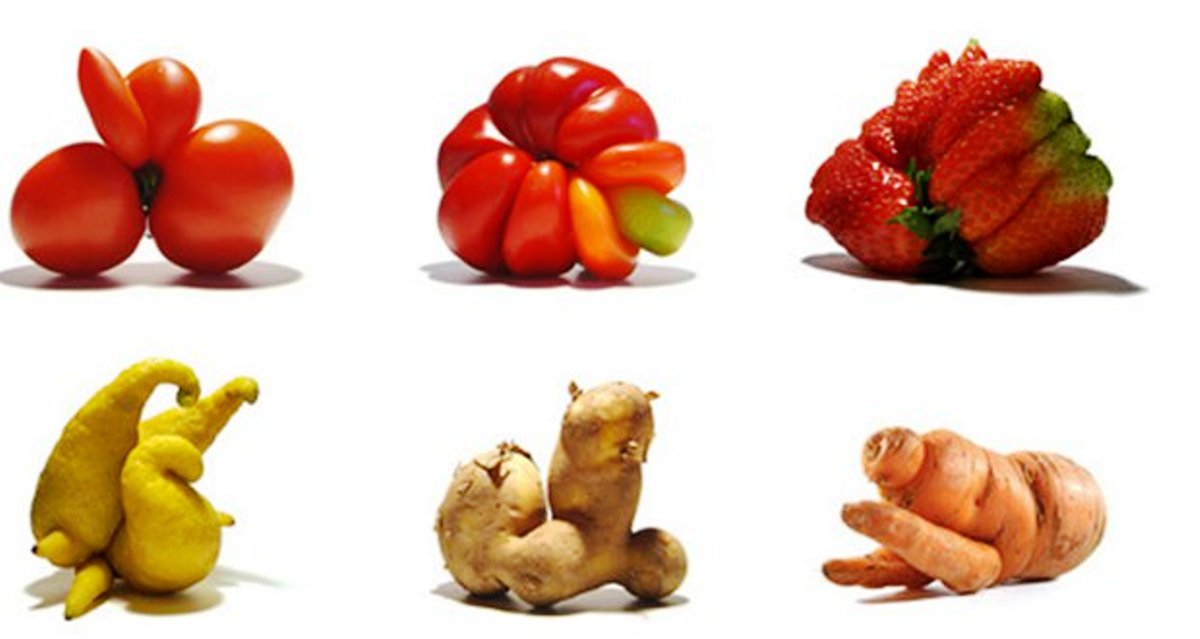Ever grown an ugly fruit or veggie? An oddly shaped tomato or a potato that looks like a duck? Did you eat it or toss it into the trash? If you ate it, congratulations! You’re a part of a growing (pun intended) movement of people trying to reclaim ugly fruits and veggies.
‘Ugly’ fruits and vegetables are simply pieces of produce that do not measure up to grocery store standards. The ‘ugly’ label can be based on the size, shape, or coloring of a fruit or vegetable, or on blemishes found on its surface. In the Ag industry, ‘ugly’ produce is considered “Number 2-grade” or lower and often cannot be sold to grocery stores. Some growers will sell this produce at Farmers Markets instead, use it to feed their own families, or compost it. However, much of it ends up going to waste.
Food Waste
Because many grocery stores will not accept ugly produce, there’s often a surplus. And because consumers are so used to seeing Number 1-grade produce in stores and in the media, many are unaware that ugly fruits and vegetables can be just as tasty and nutritious as “normal” ones. This lack of education around ugly produce means that far too often, it doesn’t make it to the consumer and becomes food waste.
According to “Imperfect Produce”—a produce delivery subscription company—1 in 5 fruits and vegetables grown isn’t able to be sold in grocery stores. This contributes to food waste and represents a loss on investment for growers. Research from the UN shows that worldwide, humans waste 222 million tons of food annually. For the US, that works out to around 20 pounds of food waste per person per month—about 30-40% of our overall food supply. If food going to waste wasn’t bad enough, the way it’s disposed of makes matters even worse: in the USA, organic waste is the second highest component of landfills, which are the largest source of methane emissions.
France
Thankfully, some governments are stepping up to change their food waste situation. For example, France has been in the news lately for passing legislation barring supermarkets from intentionally spoiling and throwing away food. Supermarkets in France will now be required to donate unsold food to charities or for animal feed or face major fines or jail time. This initiative is stricter than the UK’s voluntary food waste reduction agreement and represents a trend more governments might follow in the future.
If you’re wondering why a supermarket might intentionally spoil or throw out unsold food, the answer is liability. Many people worry about their liability when it comes to food donation: if they give away food they fear might be spoiled or about to spoil, that food might make someone sick and the store might be sued or held responsible for damages. However, in the United States, the Emerson Food Act protects against that very situation. It basically states that except in situations of gross negligence or intentional misconduct, donors of almost all kinds are protected against liability arising from illnesses related to their donations.
Farms to Food Banks
Here in Kentucky, the Kentucky Association of Food Banks administers a food-waste recovery initiative called Farms to Food Banks. Farms to Food Banks pays farmers and growers for their surplus and Number-2 grade produce. From there, the ugly produce is distributed free of charge to hungry Kentuckians through Kentucky’s sprawling food bank network. This ensures that growers receive a return on investment for the labor they put into growing the produce and ensures that the food grown makes it to local families that need it the most. Although the Kentucky Association of Food Banks pays just below wholesale prices in order to avoid competing with the market, the pay is usually enough to cover the costs of picking, packing, and delivering the produce to the nearest food bank or pantry.
The best part about ugly produce though? It’s…
Funny-looking!
#ThrowbackThursday ??✈️ pic.twitter.com/G63l30v6MH
— @UglyFruitAndVeg (@UglyFruitAndVeg) February 4, 2016
ICYMI – “They tell me I’m too small for the supermarket. Take me with you!” #CarrotBackpacking Pic by @ZoeColosimo pic.twitter.com/JYoUeYMyVb
— @UglyFruitAndVeg (@UglyFruitAndVeg) January 27, 2016
ICYMI – The Carrot Pig’s Head for Christmas Dinner! ??? Pic by Garden Organic #VegHead #VeganPig pic.twitter.com/WjnQzGTlwl
— @UglyFruitAndVeg (@UglyFruitAndVeg) December 25, 2015
And Finally
Once ugly produce is cut and prepared, it’s just as beautiful—and edible and nutritious—as ‘normal’ produce!
A Beautiful Wheel of What Was Wonky Veg! IG Pic by @UglyProduceIsBeautiful ? pic.twitter.com/fZrfUAQpqm
— @UglyFruitAndVeg (@UglyFruitAndVeg) February 13, 2016




That elephant strawberry is too much!!
I LOVE the snuggle-carrots!!!